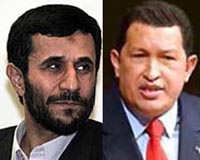| . |  |
. |
Beirut, Lebanon (UPI) Sep 15, 2009 Russia's defense industry is in the throes of a major sales drive in the Middle East as it seeks to bolster its dwindling fortunes. Saudi Arabia and Syria are the main targets, but swelling political tensions in the ever-volatile region, as well as a deep Arab distrust of Russian-built hardware that goes back to the Middle East's wars of the 1960s, could militate against Moscow's plans. Libya, Algeria and Yemen, all Soviet customers during the Cold War, are also on Moscow's target list. But the real prize is Saudi Arabia, for decades a U.S. bulwark in the Gulf but now pursuing a more independent foreign policy. There have been several reports in recent weeks, primarily out of Moscow, that negotiations with Saudi Arabia on a package of contracts worth some $2 billion was "nearing completion." On Aug. 3, the spokesman for Russia's Foreign Ministry, Andrei Nesterenko, confirmed that Moscow was "working in this direction." Since the 1960s, the Saudis have bought their military equipment almost exclusively from the United States and Britain, with France trailing third. But according to Russian sources, the Saudis seek up to 150 helicopters, including Mi-17 and Mi-35 models and other weapons systems. The state media reported on Aug. 25 that negotiations to acquire an unspecified number of Mi-171B transport/assault helicopters were in the final stages. Russia's Interfax news agency said state-run arms exporter Rosoboronexport was also seeking to sell Riyadh T-90 main battle tanks, 250 BMP-3 infantry fighting vehicles and several dozen air-defense missile systems. Riyadh has not confirmed any of this. But there were reports that the Saudis were prepared to make some big-ticket military purchases from Moscow if it scrapped the sale of advanced S-300 air-defense missile systems and as many as 250 Sukhoi strike aircraft to Iran. The Islamic Republic is Saudi Arabia's main rival in the Gulf region and the most controversial of Russia's arms customers in the Middle East because of its nuclear program, which Moscow is aiding. So far the Russians have not delivered such systems to the Iranians, in part because of strenuous U.S. and Israeli objections, although it sold Tor M1 short-range air-defense missiles to Tehran to protect its nuclear facilities. The Russians have found it diplomatically useful to backpedal on these reported contracts, even though Moscow wants to bolster its sagging defense industry. The United Arab Emirates, Saudi Arabia's main military rival with the Gulf Cooperation Council alliance and a traditional buyer of Western arms, has purchased Pantsir-S1 air-defense missile systems from Moscow. That contract was signed in 2000, but the first deliveries of the Pantsir, modified to U.A.E. specifications, have yet to be made. Russian officials said in March that this was imminent. The reason for the long delay has never been explained, but it is unlikely that this has made a positive impression on potential customers for Russian arms in the region. Reports from Moscow indicate that Syria, a key Soviet client during the Cold War, is to get eight MiG-29M interceptor fighters, although a $400 million deal for more advanced MiG-31E jets seems to be in abeyance because of U.S. and Israeli objections. Syria, whose military has been largely neglected in terms of new equipment over the last two decades, needs to upgrade every segment of its Soviet-supplied military, especially air-defense and missile capabilities. Moscow would be its natural supplier -- if Damascus had the cash. However, its ally Iran does. Even so, Jane's Defense Weekly noted in a recent analysis of Middle Eastern military procurement programs that the Arabs have a deep suspicion of Russian arms. "Technological advances notwithstanding, there is a deeply rooted shortage of confidence in Russian-made hardware among Gulf states," it observed. "Russia is trying to restore some of its power in the Middle East, but its capability is limited because of the doubt about Russian technology," explained Mustafa Alani, director of security and terrorism studies at the Gulf Research Center in oil-rich Abu Dhabi, the U.A.E.'s economic powerhouse. "The lack of interest in Russian weaponry dates back to the 1950s and 1960s when Middle Eastern countries such as Egypt, Iraq and Syria pitted their Russian-made systems against Israel and its U.S.- and Israeli-made weapons and their own systems wanting," Jane's commented. "The instability of Russia's economy has only compounded concerns and accentuated reluctance within the Gulf states to acquire Russian equipment. The secrecy surrounding the true nature of the industry has meant that bankruptcies, mergers or dissolution of Russian state-owned industries could come without warning." Share This Article With Planet Earth
Related Links The Military Industrial Complex at SpaceWar.com Learn about the Superpowers of the 21st Century at SpaceWar.com
 Military industries in Iran-Venezuela link
Military industries in Iran-Venezuela linkLondon (UPI) Sep 15, 2009 Military industries will feature in Venezuela-Iran defense and security cooperation that received a boost when President Hugo Chavez visited Tehran earlier this month, analysts said. Iran's armament industries are more advanced than Venezuela's defense production capability and Iran has been keen to lend its experienced personnel and offer their special knowledge to any nation that ... read more |
|
| The content herein, unless otherwise known to be public domain, are Copyright 1995-2009 - SpaceDaily. AFP and UPI Wire Stories are copyright Agence France-Presse and United Press International. ESA Portal Reports are copyright European Space Agency. All NASA sourced material is public domain. Additional copyrights may apply in whole or part to other bona fide parties. Advertising does not imply endorsement,agreement or approval of any opinions, statements or information provided by SpaceDaily on any Web page published or hosted by SpaceDaily. Privacy Statement |